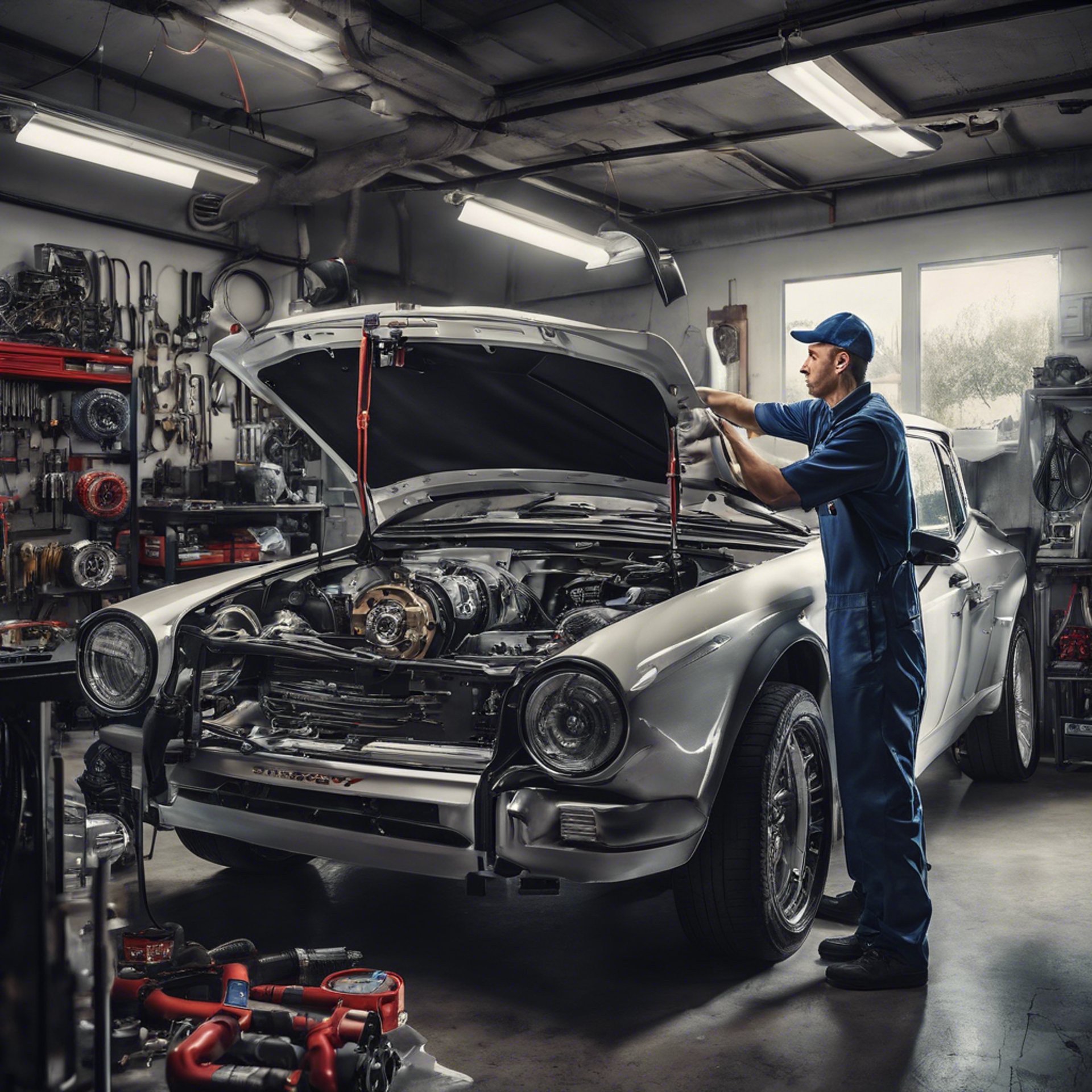The Importance of Preventive Maintenance for Your Vehicle
11/21/20247 min read

Understanding Preventive Maintenance
Preventive maintenance is a proactive approach to vehicle care that involves regular inspections, servicing, and replacement of components to prevent failure and extend the lifespan of the vehicle. The primary purpose of preventive maintenance is to ensure that vehicles operate smoothly and efficiently while minimizing the risk of unexpected breakdowns. By addressing potential issues before they escalate into major problems, vehicle owners can save time and money in the long run.
Preventive maintenance encompasses a variety of tasks that are typically performed at scheduled intervals based on time or mileage. Common activities include oil changes, tire rotations, brake inspections, and fluid level checks. These actions not only help maintain optimal performance but also enhance safety by ensuring that critical systems function properly. This systematic approach to vehicle upkeep significantly contrasts with reactive maintenance, which occurs only after a vehicle has exhibited signs of failure or malfunction.
Reactive maintenance, while sometimes unavoidable, tends to be more costly and inconvenient. Waiting for a problem to occur before taking action can lead to extensive damages that require substantial repairs. For instance, neglecting an oil change could result in engine wear and tear, which might necessitate a complete engine rebuild—an expense that could have been easily avoided with regular maintenance. Therefore, embracing preventive maintenance is essential for vehicle longevity and reliability.
In summary, understanding preventive maintenance is crucial for vehicle owners who wish to optimize their investment. This approach not only helps avoid unexpected breakdowns but also contributes to a safer and more reliable driving experience, emphasizing the need for routine inspections and servicing.
The Benefits of Regular Maintenance
Regular preventive maintenance plays a critical role in ensuring the optimal performance and longevity of your vehicle. One of the primary benefits is the enhancement of vehicle performance. Routine checks and services, such as oil changes, air filter replacements, and brake inspections, can help keep your vehicle running smoothly and efficiently. According to the American Automobile Association (AAA), vehicles that receive regular maintenance often exhibit improved acceleration and overall drivability compared to those that do not follow a consistent maintenance schedule.
In addition to performance benefits, regular maintenance can lead to increased fuel efficiency. A well-maintained vehicle operates more efficiently, which can result in significant savings at the pump. Studies have shown that cars that undergo regular service can achieve up to 10% better fuel economy. This efficiency not only benefits the driver's wallet but also contributes to a reduction in harmful emissions, aligning with environmental responsibility practices.
Another advantage of routine maintenance is the prolongation of your vehicle's lifespan. Keeping up with recommended service intervals makes it possible to catch minor issues before they escalate into major problems. For instance, timely tire rotations and alignments can prevent uneven wear, extending the life of both tires and suspension components. Many manufacturers suggest that a well-maintained car can easily last over 200,000 miles, significantly exceeding the average lifespan of 12-15 years.
Moreover, the safety of both the driver and passengers is greatly enhanced through consistent preventive maintenance. Regular inspections can identify potential safety hazards, such as worn brake pads, malfunctioning headlights, and other critical systems that require attention. Statistics from the National Highway Traffic Safety Administration (NHTSA) indicate that vehicles that have been properly maintained are less likely to be involved in accidents due to mechanical failure.
Common Preventive Maintenance Practices
Preventive maintenance is critical for ensuring the longevity and optimal performance of your vehicle. Adopting regular maintenance practices can significantly reduce the likelihood of unexpected breakdowns and costly repairs. Below, we outline several common preventive maintenance activities that all vehicle owners should prioritize.
One of the most essential practices is scheduling regular oil changes. Engine oil lubricates the engine’s moving parts, preventing wear and tear. Over time, oil can become dirty and less effective. Most manufacturers recommend changing the oil every 5,000 to 7,500 miles, or as specified in your vehicle’s owner’s manual. Regularly changing the oil not only enhances engine performance but also extends its lifespan.
Another crucial practice is checking tire pressure. Properly inflated tires improve fuel efficiency and provide better traction, reducing the risk of accidents. Tire pressure should be checked at least once a month and before long trips; the ideal PSI is usually found on the driver's side door panel or in the owner’s manual. Additionally, rotating the tires every 5,000 to 8,000 miles can promote even wear and prolong their lifespan.
Replacing air filters is also vital for maintaining the efficiency of your vehicle. A clean air filter enables the engine to run smoothly and enhances fuel economy. It is generally recommended to inspect the air filter every 15,000 miles and replace it when dirty. Regularly replacing filters will also improve air quality inside the cabin.
Lastly, inspecting the brake system is imperative for safety. Brakes are one of the most crucial components, and their failure can lead to dangerous situations. Checking brake pads, rotors, and fluid levels at least once a year helps ensure reliable braking performance. Early identification of issues in the brake system can prevent expensive repairs and safeguard your well-being.
The Cost of Neglecting Maintenance
Preventive maintenance is paramount for vehicle longevity and safety. When drivers neglect regular maintenance, they often underestimate the potential financial implications that can arise. Minor issues, such as a small oil leak or worn brake pads, can escalate into significant repairs, leading to costly expenditures that could have been avoided through timely interventions.
For instance, a simple check of the engine oil level or air filter can prevent more severe engine problems that require expensive replacements. Ignoring such basic maintenance tasks can lead to a chain reaction where one overlooked problem exacerbates another, ultimately resulting in higher repair bills. Regular maintenance reduces the likelihood of unexpected breakdowns, which can incur significant costs associated with roadside assistance and towing services.
Furthermore, neglecting preventive maintenance adversely impacts your vehicle's resale value. A well-maintained vehicle retains its worth, as prospective buyers are more inclined to purchase a car with documented maintenance history. In contrast, a poorly maintained vehicle is likely to suffer from depreciation due to functional issues, which could have been mitigated with regular servicing. This lack of attention can diminish the car's value significantly, costing drivers thousands of dollars in lost potential revenue when it comes time to sell.
Additionally, ignoring maintenance routines increases the risk of accidents. Faulty brakes, worn tires, and malfunctioning lights can lead to dangerous situations on the road. Accidents can result in not only severe financial implications due to vehicle damage but also potential legal liabilities and insurance complications. Prioritizing preventive maintenance is, therefore, not merely an expense; it is a crucial investment in safety and financial prudence.
Creating a Maintenance Schedule
Establishing a proactive maintenance schedule is crucial for the longevity and performance of your vehicle. A well-structured plan enables car owners to keep track of essential tasks, ensuring that maintenance is conducted at the proper intervals. By prioritizing regular checks and services, drivers can prevent potential issues that may arise from neglecting their vehicles.
Utilizing mileage markers is an effective way to monitor maintenance needs. Many vehicles have specific maintenance requirements at predetermined mileage thresholds. For instance, oil changes are typically recommended every 3,000 to 5,000 miles, while air filter replacements may be needed every 15,000 to 30,000 miles. Keeping a simple log or spreadsheet that notes upcoming service dates based on your car's mileage can serve as an effective reference point. It provides a visual cue that highlights upcoming tasks and maintains awareness of essential maintenance needs.
Consulting the owner’s manual is another key factor in creating your maintenance schedule. This document contains manufacturer recommendations regarding the frequency of various services, such as fluid replacements, brake inspections, and tire rotations. Adhering to these guidelines not only ensures that your vehicle operates smoothly but may also help in maintaining warranties. Setting reminders on your phone or calendar can facilitate timely appointments, further enhancing your vehicle’s upkeep.
It is also beneficial to maintain detailed records of completed maintenance tasks. Documenting each service helps track patterns over time, allowing car owners to identify recurring issues or irregularities. These records can prove invaluable when discussing repairs with a mechanic or selling the vehicle in the future. By establishing a regular maintenance schedule and fostering diligence in tracking, vehicle owners can effectively enhance their vehicles' reliability and safety in the long run.
Choosing the Right Service Provider
Selecting the appropriate service provider for vehicle maintenance is crucial to ensure that your preventive maintenance is carried out effectively. A reliable mechanic or service center can impact your vehicle's longevity and performance significantly. Thus, it is essential to consider several factors when making your choice.
Firstly, certifications play a vital role in identifying a trustworthy service provider. Mechanics certified by reputable organizations, such as the National Institute for Automotive Service Excellence (ASE), demonstrate a commitment to maintaining industry standards. These credentials indicate that the mechanic has undergone extensive training and possesses up-to-date knowledge about various vehicle technologies and repair practices. Ensuring that the service provider holds relevant certifications can give you confidence in their abilities.
Moreover, customer reviews are an invaluable resource when assessing a service provider's reputation. Online platforms, such as Google Reviews or Yelp, offer insights into the experiences of previous clients. Pay attention to comments regarding the quality of service, professionalism, and adherence to timelines. A service center with consistently positive feedback is likely to be a reliable choice. Additionally, consider seeking recommendations from friends or family who have had satisfactory experiences with local mechanics.
Transparency in pricing is another critical factor to consider. A competent service provider should be willing to provide a detailed estimate before starting any work. This estimate should outline the costs of labor, parts, and any additional fees. Be cautious of service centers that pressure you into making quick decisions or those that do not communicate transparently about their pricing structure. Clear communication fosters trust and ensures that unexpected expenses do not arise during the maintenance process.
In summary, choosing the right service provider for vehicle maintenance requires careful consideration of certifications, customer feedback, and pricing transparency. By taking the time to research and evaluate your options, you can make informed decisions that will benefit your vehicle’s health and your peace of mind.
Conclusion: The Long-Term Impact of Preventive Maintenance
In the realm of vehicle ownership, adopting a preventive maintenance strategy is essential for ensuring the longevity and reliability of your automobile. Throughout this blog post, we have explored the significance of routine maintenance checks, timely repairs, and maintaining optimal fluid levels. Each of these components plays a crucial role in preserving the performance and safety of your vehicle over time.
Investing in preventive maintenance not only assists in preventing costly repairs but also enhances fuel efficiency and overall driving experience. A well-maintained vehicle is less likely to encounter unexpected breakdowns, allowing drivers to enjoy their time on the road with greater peace of mind. By routinely inspecting and servicing critical systems such as brakes, tires, and the engine, owners can avoid major malfunctions that could lead to expensive replacements or prolonged downtimes.
Furthermore, timely attention to maintenance issues contributes positively to a vehicle’s resale value. Prospective buyers are often inclined to pay a premium for a car with a documented maintenance history, knowing that it has been cared for adequately. This is particularly relevant in today’s market, where a well-maintained vehicle not only promises reliability but also demonstrates the owner's commitment to sustaining quality over time.
Ultimately, a proactive approach towards vehicle care encapsulates the essence of preventive maintenance. By engaging in regular assessments and addressing potential concerns before they escalate, vehicle owners are not just preserving their investment but also ensuring personal safety for themselves and their passengers. Emphasizing the critical nature of continuous maintenance will undoubtedly yield substantial long-term benefits, fostering a sense of responsibility and diligence in vehicle ownership.
About the company
Auto Tarun Pvt Ltd ( ESSARR 4X4 ), founded in October 2021, is your trusted partner for high-quality multi-car spare parts and accessories.
Contact us
autotarun.india@gmail.com
+91 9740606290 / +91 9902004345
© 2024 Auto tarun Pvt Ltd All rights reserved.
Mon -Sat : 9:30 am to 6:30 pm
NO.39 (MIG, 80 Feet Rd, Kengeri Satellite Town, Bengaluru, Karnataka


GSTIN : 29AAVCA9568M1ZD
Email:
Get in Touch
Call:
